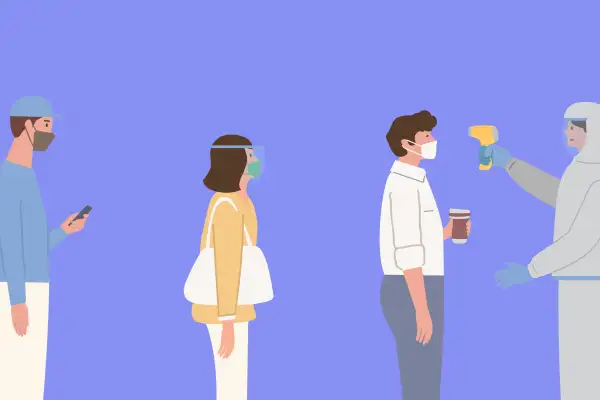Mandatory Temperature Checks Could Soon Be a Part of Your Daily Work Routine

At Baldwin & Shell, a construction company based in Little Rock, Arkansas, anyone who enters one of the company’s five offices or dozens of job sites across the Southeast must undergo a health screening for COVID-19.
Each location features a single entrance checkpoint with signs explaining the process: Every single person must self-check their temperature using a handheld scanner, and if it exceeds 100 degrees Fahrenheit, they’re required to leave immediately.
“It doesn’t matter if you are a client, CEO, carpenter or delivery driver,” says Amanda Mack, the company’s director of human resources. “If you walk through our door, you must be screened to pass the checkpoint.”
Baldwin & Shell belongs to a growing number of U.S. businesses that are instituting health screenings—via temperature checks or actual COVID-19 tests—as states lift shelter-in-place orders and people return to work.
The suggestion comes straight from the Center for Disease Control and Prevention (CDC), which is encouraging businesses to conduct daily in-person or virtual health screenings to slow the spread of coronavirus. Some state governments are also recommending company-wide health screenings. The Ohio Department of Health, for example, is pushing “daily symptom assessments” for every worker in the state.
It’s a strange postscript to an even stranger spring, and for many employees, it’s going to make getting back into the swing of things pretty difficult.
Here’s what you need to know.
This is new, but necessary
Plenty of workplaces have security measures like metal detectors and bag checks, but health screenings are unprecedented, says David Barron, a labor and employment attorney at Cozen O’Connor in Houston, Texas.
Usually, employers are prohibited from asking too many questions about employees’ health status, like whether someone has a medical condition or pressing for details on a diagnosis a worker has voluntarily disclosed. But the Equal Employment Opportunity Commission (EEOC) just released new guidance permitting employers to screen for COVID-19 as long as they meet certain guidelines.
Some screenings are recommended by local governments — or even mandated by them. Like Washington state, which now requires office workers and personal-services employees like salon workers to be screened for virus symptoms.
“So if you’re in a jurisdiction where the governor or the county or city says, ‘You have to do this,’ then you really have to,” Barron explains.
Few rules apply (for now)
Major companies like Walmart and Ford are taking it upon themselves to screen workers nationwide. And some companies, like Baldwin & Shell, are opting to also screen customers, vendors and visitors.
How companies conduct these health screenings is mostly up to them, since few specifics have been provided by the CDC or state governments.
Some are asking employees to self-report their health status through an app like SafetyTek or Ceridian. Others are taking workers' temperature using a handheld device or thermal imaging camera. A few may actually administer a COVID-19 test.
No matter how screenings are done, HR experts say you must legally be told about them and what they involve in advance. The process must also be nondiscriminatory: Companies that screen employees must screen all employees, or face a potential discrimination claim, says Carla Yudhishthu, vice president of people operations at ThinkHR and Mammoth HR.
Companies also must conduct screenings in a way that ensures employee privacy, Yudhishthu says. Health information must be kept confidential and separate from personnel files.
“If you feel that your privacy or health information has been compromised, you should report it to your internal HR or company leadership immediately,” she says.
You probably can’t refuse a health screening
Health screenings for COVID-19 legally resemble other common practices, like requiring someone to pass a drug test before they're hired, or conducting fitness-for-duty exams to make sure someone is able to perform a job, Barron says.
Most likely, employees will have to comply with COVID-19 health screenings, too, or risk being fired.
There are some potential exceptions, like if you know you won’t pass a screening because of another health condition, or if you feel like it violates your religious beliefs. Still, even in those cases, Barron says a screening would likely be required. The employer would just make an accommodation.
Do you have legal recourse over your employer’s handling of COVID-19 health screenings? It’s too early to tell, Barron says, but he suspects cases to pop up after the pandemic.
At issue is the “friction” between an employee's right to privacy under the Americans with Disabilities Act (ADA) and an employer’s right to protect its workforce, he says.
“If the employer is doing something like a medical inquiry or temp screenings to take out this direct threat to its workforce, then it's going to be very hard for employees to sue or complain about that,” Barron says. "It would be treated like any other failure to follow a safety rule.”
Health screenings could lead to lasting workplace changes
The COVID-19 pandemic has changed so much about how we work. And things probably won’t go back to normal anytime soon.
As a whole, companies will need to rethink how their employees interact, Yudhishthu says. Many will have to increase the distance between desks, impose elevator and hallway capacity limits, stagger work times, and require all employees to wear masks.
“It will tighten our criteria for what constitutes a safe and healthy work environment,” she says.
Even after the pandemic passes, she adds, “It’s hard to see us going back to the way work used to be.”
More from Money:
True or False: Ignoring the Census Could Cost You $5,000
A State-by-State Guide to Getting Pandemic Unemployment Assistance Benefits
How to Tell if a Job Offer is Secure in an Unstable Labor Market